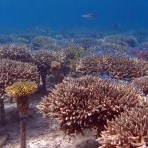 Japanese researchers are finding clues to help with the conservation of coral reef ecosystems in waters around the world by studying Acropora. Through the establishment of DNA markers, similar to DNA profiling in humans, individual corals can be accurately identified. This means that scientists can find genetic diversity and connectivity among Acropora coral populations.
Japanese researchers are finding clues to help with the conservation of coral reef ecosystems in waters around the world by studying Acropora. Through the establishment of DNA markers, similar to DNA profiling in humans, individual corals can be accurately identified. This means that scientists can find genetic diversity and connectivity among Acropora coral populations.
Coral reefs face a range of risks, from bleaching, to sediment loads, to predation. Increasing diversity helps to build reefs that are more hardy and can withstand environmental changes.
The work done at the Okinawa Institute of Science and Technology (OIST), by Dr. Chuya Shinzato and his team, has direct implications for Okinawa. Acropora coral is the most common coral in the area and thus, the study can be applied to most of Okinawa’s coral reefs. The Okinawa Prefectural Government has already employed the team’s technology to help preserve and regenerate corals in nearby waters.
Not only has this research affected Okinawa, but it may in fact be the start to GLOBAL coral reef restoration as the microsatellite DNA markers established by the OIST team can be applied to all Acropora corals in the world!
For more information on this study see: http://www.oist.jp/
For more information on how coral reefs are being affected by rising ocean temperatures go to the One Species at a Time Coral podcast by Dr Randi Rotjan of the New England Aquarium.









0 Comments